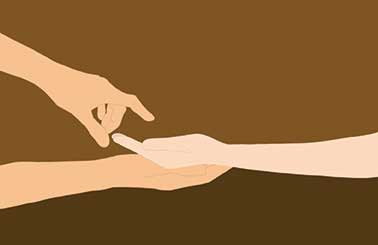Geetha Durairajan
As human beings we use words to talk to others, to fulfil many functions; we ask or give information, we invite, greet or wish others, we ask or give permission, etc. We also use language to praise others or value what they have done, to compliment them; very often however, we use the same language to chide, to scold, to punish, to find fault, to mock, poke fun at others and to criticize. We need to remember that the spoken word, once uttered, cannot be taken back and that words, when used harshly, can hurt a lot more and cause permanent damage. To quote a couplet from Thirukkural, written by Thiruvalluvar, (circa 300 BCE),
ThiiyinaalchuttapuNuLLaaRum, aaRaadhee
naavinaalchuTTavadu
(The wound caused by fire will heal from inside, but the scar left by the tongue will never heal.)
This is something all human beings need to keep in mind; as teachers, who are responsible for enabling young minds, it becomes even more important. In this article, I am going to reflect as a student on my experiences with research supervisors and the difference the choice of words can make to the writing ability of students and their confidence in themselves. By implication, it is applicable to all teachers in general, and language teachers in particular for all of us to get our students to write and give them feedback.

My first narrative takes me back nearly three decades, when I had just begun my career, and had started to write research articles. I took some data that I had collected on communicative language teaching (I had administered some tasks and had analyzed the responses) and wrote it up as a draft paper and gave it to my supervisor, Prof. Jacob Tharu, to read. I waited with bated breath over the two days he took to read the article. Just because I was already a faculty member did not mean that I was not worried; like all other students, I was not sure how good or bad it was. Nearly three tense days later, he called me to his room, took my hand in his palm, turned it upward, tapped a single forefinger on the palm and said, “It is going to be very difficult to get you to write,” in a very gentle voice, but also added, “You have analyzed and presented your data very well, but what is the connection between what you have analyzed and your introduction? It just does not match!” I was miserable that my introduction was all over the place. I wanted the Earth to open up or I wanted to cover my face and be miserable. I knew I had not done a good job with the introduction. I had not known how to begin and so had taken the introduction from an earlier related article and added it, or rather just bunged it in here. I decided to confess all, came clean and told my supervisor all this. At that point he just smiled and said, “I hope you learnt your lesson. Go and write a fresh introduction! But let me also tell you, your conclusions read like a dream.” This was enough. Having sheepishly confessed to my mistakes, knowing that I can write good conclusions, I was able to write a fresh introduction and before I knew it, that article had been accepted for publication.
I was lucky that my supervisor was the kind of person who scolded with care and also praised freely. Over the years, I have been given such good constructive criticism. Unfortunately, not all teachers/supervisors are like this. One of my fellow PhD students who was working with someone else came to my office room one day, weeping and crying, and said in a choked voice, not able to get any words out, “Geetha, I can’t take it anymore. I am just going to quit. That man is impossible.” It took me at least half an hour to calm her down. Then slowly the whole story came out. She had submitted the first draft of one chapter to her supervisor. This man took around a week to read it and asked her to come see him in his office. When she knocked, he curtly asked her to enter, brusquely told her to sit down, took his own sweet time (pretending to do something else, while letting her squirm and get uncomfortable) and then took out the chapter she had written, literally threw it at her face and said, “What is this rubbish that you have written? Do you even call this writing? You don’t know how to write! Go back to school and learn,” and so on. The poor girl was devastated. When she tried asking him, very softly, in a timid and scared voice, “Sir, but tell me what is wrong? Tell me what to do and I will rewrite,” he just barked at her and said, “If you don’t know what is wrong with this, I can’t tell you. You are not fit to do a PhD in English. Get out of my office!” With great difficulty I was able to soothe and calm her and said that together the two of us could sort it out and that she should not allow the judgment of one person affect her like this.

In both cases, my friend and I had written and submitted work that was not up to the expectations or demands of the respective teachers/supervisors. Both of us got scolded, but there is a huge chasm between the two scoldings. My supervisor took it upon himself to state, ‘I will have to work hard with you to get you to write,’ but was also able to find at least one good bit of work done and compliment me on it. The other supervisor, by contrast, laid the whole blame on the student, reduced her to feeling like a worm and made her want to quit and leave the programme. I was scolded, but with love and care; the end result, I was able to ‘confess’ my mistakes and was encouraged to revise, rewrite and come back. My friend was also scolded, but so harshly that she lost all her self-esteem, thought she could not write and was completely destroyed.
All of us as human beings need to be careful and watchful about the language we use, it has the potential to be used constructively, neutrally or destructively (to get a clearer understanding of this concept, read the cover story by Shree Deepa). But as teachers, we have a bigger responsibility. All students look up to their teachers and value what they say. As such, what we say and how we say it matters. We need to use our tongue to speak in a very careful manner for we may make or break another human being with the words we utter. Corporal punishment may have been banished from schools but the wounding we do with our tongues can have a much more debilitating effect than a single whack with a foot ruler on the knuckle.
The author is a retired professor from the English and Foreign Languages University, Hyderabad. She can be reached at gdurairajan@gmail.com.
Related Articles
